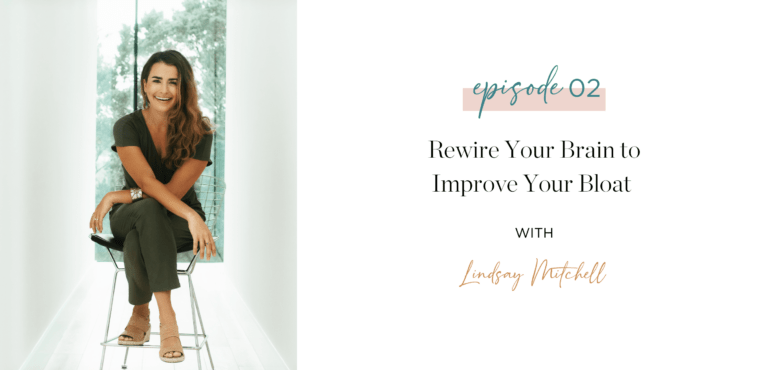On today’s episode of the love your gut podcast, we are joined by Lindsay Mitchell, founder and CEO of her company Vital-Side. Lindsay is a certified physician assistant, Neuro-linguistic Programming (NLP) practitioner, and an Emotional Freedom Technique (EFT) and Thought Field Therapy (TFT) practitioner. She joins us this week to discuss her work, her journey with Lyme disease, Neuroplasticity, and how the brain changes when we have a chronic illness. Lindsay discusses the necessity of learning how to regulate our nervous system as well as other fascinating stories such as other people’s healing journeys. Enjoy this amazing episode by tuning in.
In this Episode You’ll Learn:
[01:43] What Lindsay Mitchell does and a quick overview of Vital- Side
[03:05] Mitchel’s own journey with Lyme disease and her healing process
[04:50] About Neuroplasticity, and how the brain changes when you have a chronic illness
[09:45] How the nervous system is intertwined with the gut where neuroplasticity lands.
[ 12:11] Why food is a huge limitation because you have sensitivities
[12:55] About chronic stress response
[14:37] What happens when we have a leaky gut
[16:26] How can we break chronic stress response, that negative feedback loop and tools to use
[19:10] How to identify the stress response, and then what you can do in the moment to get out of it
[21:43] First step to change your association with food and setting up your body for success
[25:50] Situational gut issues, specific triggers and how to react
[ 31:15] How would someone know if they should neuroplasticity and brain retraining when they have no anxiety
[39:01] The importance of learning how to regulate our nervous systems
[43:21] Lindsay Mitchell’s favorite way to love her gut
Quotes:
· “And that is how humans were designed is to have healing properties that allows us to not just survive, but thrive.” [08:26]
· “The brain is constantly communicating to the body, including the gut, and through so many different ways. You know, most of our serotonin is produced in the gut.” [11:15]
· “It doesn’t matter where the trauma stems from, our bodies respond in the same way,” [12:48]
Transcript:
Hey, welcome to the love your gut podcast. I’m your host, Dr. Heather Finley, I know what you’re thinking, how am I supposed to love my gut when all it does is hold me back. I thought the same thing before I found relief from my own gut health issues. I dedicated my life to getting into the bottom of my own gut issues. So I can help women just like you transform theirs. Now, I’m here to guide you through your own gut health journey. We do this through identifying your root causes and making sustainable and transformative changes. As a result, you can unleash your true potential. My goal is to empower you with the information and tools you need to love your gut. So it loves you back right here on this podcast. Welcome back to the love your gut podcast. I am so glad to be joined today by Lindsey Mitchell. We have known each other for a while now. And she’s actually been a guest speaker in the Get Together program. And she I recommend all of our clients to follow her work, because it’s so amazing. So I am so honored to have her with me today. Thanks for joining Lindsey.
Oh, my goodness, Heather, thank you so much for having me, I have loved working with you over the years, it’s, you know, great to know someone who knows the gut as well as you do, and then Pair that with nervous system stuff. It’s just the recipe for success and a lot of people’s healing journeys.
It really is. And I think oftentimes, I know we spend a lot of clients to your program, because the nervous system piece is a missing piece on their healing journey. So that’s what we’re going to talk about today, I would love it, if you would just share a bit about what you do, kind of how you landed here, and then we’ll kind of take it from there.
Sure. So I by trade, I am a physician assistant, and I specialized in internal medicine. Now I specifically focus on nervous system regulation, specifically with people who have chronic illnesses or chronic symptoms. So chronic fatigue syndrome, you know, irritable bowel syndrome, chronic pain, autoimmune conditions, that’s kind of my specialty now, and we specifically hone in and focus on the nervous system. So that’s what I do in my company vital side. It’s a brain retraining program for people with chronic symptoms, to really start to regulate their autonomic nervous system. So they’re no longer responding from that hyper inflammatory, hyper reactionary response physiologically. And it’s really cool, because you can do that through structured techniques, structured protocols, to start to shift that response. And how I kind of got started in this was through my own journey with Lyme disease and having been a practitioner, and been very active, I was the travel pa at the time, I was, you know, huge adventurer. And then I was bitten by a tick and I received the diagnosis of Lyme disease. And it was like my whole world was just turned upside down, I quickly, you know, just cause joint pain and daily migraines. I never had a migraine in my life and quickly had so much empathy for people who experienced migraines.
I became really sensitive to my environment. So a lot of foods I was sensitive to I was anxious more often than not, there’s just a whole slew of symptoms that I experienced as a result. And I went through my journey of healing through different modalities, but I kept coming up against this kind of huge pillar that was standing in the way which was you’re still symptomatic, you know, I was still symptomatic, even after treatment, even after detox, even after doing all the you know, quote unquote, right things, changing my diet going to the practitioners and it was like, Why aren’t I seeing results? Why aren’t I feeling better? Why am I still hyper vigilant and anxious and all of the things and I was getting to be even more sensitive to my environment.
And that is when I came across a blog post about neuroplasticity, which just means the brain changes it And specifically, I started researching how the brain changes when you have a chronic illness. And so the brain starts to communicate danger to the body. And so the body responds and the body responds with inflammation, the body responds with hormones and neurotransmitters communicating that signal of danger. And so it’s this kind of cyclical negative feedback loop that occurs if like, okay, there’s danger present. So body is going to respond physiologically. And I noticed, like, all of this makes so much sense to me when thinking about my own symptoms, because I was thinking, you know, I have kind of from the outside, I have a healthy body, why am I still inflamed? Why am I still hyper responsive, hyperreactive sensitive, all of these things. And it came back to my brain was receiving the message of danger, that my body was responding, and all of this as a means of trying to protect me.
So that really resonated with me. And I started to research neuroplasticity more, I started to read all the books, you know, Dr. Norman Deutsch, and Dr. Jeffery Schwartz and Dr. Candace pert, there’s so much great information out there about the brain and body communication, and really starting to understand it, so that we can communicate a new signal a safe signal, to allow the body to heal to allow the supplements to work for us, and allow our, you know, digestion to start to work again. Because when you’re in a state of survival, so you can think about like the fight or flight response or the freeze response, you’re simply focused on getting out of danger, right? How do I survive in this moment.
And so that looks like the heart beating, fast breathing rate, increasing blood flow sent to your hands and feet to stay and fight or run away. It doesn’t look like staying, and resting and digesting. And being able to connect with purpose and being able to laugh and experience positive emotions. That’s not what helps you to survive.
So what I studied then, and what I teach now, is how can we improve that brain body communication, to send that signal of safety, so that the body can start to respond, and we can access more often than not that state of rest and digest and growth and repair. And what I’ve seen in you know, the 1000s of clients I’ve worked with throughout the last five years, is that that sets the body up for success to allow their bodies to innately do what they do best, which is to heal. And that is how humans were designed is to have healing properties that allows us to not just survive, but thrive. And so that’s what I did, I tapped into that myself and my own healing journey, ended up making that full recovery, hadn’t really niching down and, you know, creating vital side to really allow other people to be able to experience the same relief and freedom in their lives, like I did.
So amazing. And I think a lot of us get into health related fields because of our own personal experience, myself included. And I think that that makes us even better providers, because we have that level of empathy, understanding kind of where the clients been and kind of can kind of speak to that hope, which I definitely hear in your story of, like, this is where I was, this is where I am now. And now I’m also empowering other people to find the same type of relief. So a lot of my listeners obviously struggle with gut issues. That’s probably why they’re listening to this podcast or they might be a practitioner that works with clients that have digestive issues. So let’s talk specifically kind of how the nervous system is intertwined with the gut where neuroplasticity lands and all of that and kind of what you’ve seen in your work. As far as some of these chronic cases. I know when you came to my group you talked a lot about SIBO and food sensitivities and how all these things were related. So kind of fill us in on what the connection is and why we should care about this if we have digestive issues.
Absolutely. So it you know, just like what you said, our not one body part is localized. And I think that’s really important because often when we deal with our own healing journey, we’re recovering from some sort of chronic symptom or chronic illness, it’s really easy to say, Oh, it’s just my gut, or, Oh, it’s just my, like, I cut my arm. And this arm now is required to heal. There’s so many other processes that take place in the body, that allows the arm to heal that, you know, is impacted, not just with one organ, but so many other organs and communication processes in the body. So I think if you can kind of expand your mind and this way, first and foremost, to understand, not one organ system is localized, and we’re constantly communicating. The brain is constantly communicating to the body, including the gut, and through so many different ways.
You know, most of our serotonin is produced in the gut, right? So all of these ways that we can talk about, but I wanted to give a specific example. Just because I know food sensitivities is a huge one for people. And personally, I love working with people who have food sensitivities, because food is so tangible. And food often represents freedom in our lives. And right now, if you’re listening, you’re like, what, maybe food to me right now means limitation. So let’s talk about that. So, first of all, from that perspective of the belief we have around food, maybe it once represented freedom and adventure, flexibility, adaptability. And now it’s a huge limitation because you have sensitivities. So what’s actually going on in the nervous system and how we have shifted our association to food. So for one reason or another, we can think of trauma in our lives, trauma meeting, a medical trauma, a physical trauma, you know, a car accident, a virus, a bacterial infection, an emotional mental, psychological trauma. So something that happened to us that was profoundly intense and impacted our nervous systems. It doesn’t matter where the trauma stems from, our bodies respond in the same way. And that’s like what I mentioned before, through this protection mode, this survival response, or for our purposes, we call the chronic stress response. So if you’re operating in that chronic stress response, what happens is, the brain says, This food is dangerous. And the body responds accordingly via that chronic stress response. So when we produce too much cortisol, which is a stress woman, for too long, you know, through that chronic stress response, eventually, our adrenal glands which sit right on top of the kidneys become exhausted, and our cortisol levels drop.
So That’s often why you may like find a dysregulated cortisol amount, you know, if you do a test, right, a saliva test or something like that, there’s kind of this, you know, low cortisol or high cortisol, you kind of get that dysregulation. So it’s when we don’t have enough cortisol levels to meet the demand that we start to feel unwell. And stress causes our mast cells to break down and release histamine all over the body, including the digestive system. So when histamine is released in the digestive system, what it does is it creates this inflammatory reaction, and that’s often what you know, we refer to as leaky gut. So when we have leaky gut, the foods that we eat are not broken down and digested properly, and large protein molecules gets absorbed into the blood.
And this triggers an immune reaction in the body. So what happens is a memory cell is created and then Next time we eat that same food, our immune system remembers this foreign protein and creates that immune reaction, that same immune reaction that you had. And it calls white blood cells to the rescue. And that’s our body’s first line of defense. So with that stimulation of white blood cells comes those histamine releasing mast cells, which can be the cause of food sensitivities. And I really liked this example. Because it allows us to step away from sort of demonizing the food itself.
And we start to shed some light on how we’re responding to that food. Right, coming back to inflammation. Why is my body responding in this hyper inflammatory, hyper reactionary way. And so you can kind of see that cascade of what happens and why the body is responding. And it comes back to the chronic stress response. And so what I teach in vital side, and what I talk a lot about, is this process of what is possible for us today, how can we break that chronic stress response, that negative feedback loop, and there are tools that we can use to break that stress response again, and again, and again, to kind of better that communication between the brain and body between the brain and the gut, so that we can start feeling better digesting properly, so we no longer have to have that immune reaction in our bodies. And it’s all about that new communication, breaking away from that chronic stress response and communicating a signal of safety.
So if someone feels like they have a bunch of food sensitivities, it’s common kind of what I said earlier, it’s common that we hear, I’m bloated, regardless of what I eat, or I, you know, break out in hives often, which that makes sense with like this histamine response, right? I break out in hives after I eat, or I have constant chronic constipation or acid reflux, like when we’re kind of tying the nervous system, your digestive system together. And you’ve so clearly described, like, how the two are so well connected? How does one start to address this if maybe they’re approaching a meal? And it is something that constantly creates bloating? Or whatever the symptom might be? How do you break that cycle? Or like, how do you get out of the stress response? If someone is unfamiliar with how these pieces go together?
Yeah, sure. That’s a good question. Because it’s like really good information, right? But how do I start? So first things first, you don’t necessarily have to know the trigger. And I just say that for my purposes, Heather, I know it’s different for you.
But for addressing the nervous system response, it could be that you’re simply tuning in today and you’re thinking, but food in general, I’m not sure which foods but food in general, causes this response, right causes a stress response, which it can if we’re stuck in that state of that chronic stress response. So okay, now I’m starting to understand how my nervous system is responding.
And I do have, I have a week free trial and my first program reset that gives you tools you can use throughout the day, which is really cool. So if you’re interested in like, I want some quick tools reset is a great place to kind of look for those simple, quick tools that teaches you how to identify the stress response, and then what you can do in the moment. So the first thing you can do is first identify that stress response, okay? When I sit down to eat a meal, okay, maybe you notice yourself getting a little bit anxious, right, maybe your heartbeats a little bit faster, bring a little bit of conscious awareness to how you’re responding just around food. And again, the chronic stress response doesn’t mean you are consciously stressed out about food. It means that your body is responding to danger in your environment. So what we can first do is bring conscious awareness to the situation. So every time you’re around food before you eat, see down and spend one minute kind of doing something different. So a few things you can do in this moment is take some deep breaths where you notice your belly rising and falling, just breathing in. And breathe breathing out. And kind of, you know, distending your belly as you do. And you can do that for a minute. While you do this, you can play one of your favorite songs, that is kind of maybe relaxing and melodic, and puts you in a good mute, good mood, just naturally, because you really enjoy the song and you can just breathe along to it, you can put your, you know, use your body in the moment, too. So you can either like cross your hands over, you can put your hands on your heart, he can put one hand on your heart, one hand on your belly. So you know, if your bellies just, you know, kind of like moving in and out, and you can feel it.
But there’s actually research done on getting into a state of parasympathetic during prayer. And so when you pray before a meal, your body is more likely to get into that parasympathetic mode. And you can digest easier because parasympathetic, rest and digest, that’s a response that we’d like to be in more often than not. And so even if you’re not a religious or spiritual person, spending some time, simply breathing and listening to your favorite song can be really beneficial. And that’s the very first step to starting to change your association, to food. And again, maybe that even is like the first step. And thinking about food as a ticket to freedom.
Because few food is this huge pillar in our lives, that does represent freedom, if you’re looking at it from that kind of, you know, curious observer perspective, will food allows travel and flexibility while travel, it leaves room for adventures or spontaneity, right? It leaves space for being flexible and adaptable. So if I do this quick exercise, right before I eat anything, that can be the first piece of evidence that food equals freedom. So you’re setting your body up for success in that moment, getting into parasympathetic as you breathe, you’re able to kind of stimulate that vagus nerve, that’s the longest nerve in the body connecting, you know, the base of the brain all the way to the gut innervating organs in between. And you’ve set your body up for success there, but you’re basically then also saying, okay, food is safe. And so consciously you can add on to that and think of food as freedom throughout the day and sort of check in every so often what is food allow me to do?
What can food gives me you know, nourishment, satiation, even start to think of positive experiences you’ve had around food, and a lot of cultures, food, sharing meals with people that’s part of community, right? We go out to dinner with friends, and so start to kind of shed some light bring awareness to this new concept of food as freedom.
I love that. And I think something and especially the clients that we see with really chronic digestive issues, they might be in a place where they don’t think that way they might think food is limiting, like you said before, or my digestive issues are limiting. I can’t travel I can’t. But what you said earlier is neuroplasticity is the science of basically changing the brain. And so I think the really hopeful part about this for anyone listening is that just because you’re having these thoughts now does not mean you have to have these thoughts forever, and you can really start to shift your thoughts with some really simple strategies. I think. Sometimes we feel like we have to overcomplicate things, especially when it comes to our mental health or physical health and the two are obviously very closely related, but just working on that opportunity that you’re talking about. Okay, food is freedom food does allow me to have memories with people It does allow me to travel. And it does allow me to, you know, fill in the blank. Even if your mind immediately goes towards kind of more of the negative thought pattern, would you say the same example that you just gave about sitting down for a meal and, you know, activating the parasympathetic, which, you know, on more of like the science side of things, my clients know this, but anytime you’re activating your vagus nerve and getting into a rest and digest, you’re actually increasing saliva, you’re then increasing enzymes in stomach acid. And so there actually is not only this, like psychological response, but a physiological response, that helps improve your digestion when you’re able to get into that parasympathetic state. But let’s talk about like, situational gut issues. So what I mean by that is like, a lot of our clients, for example, they’ll have, they’ll feel like they have to go running to the bathroom. Every time they leave the house, or I have one client that comes to mind recently, who, anytime she got in the car and left her house, she was feeling like she was going to have to go to the bathroom. So what would you say to that? That type of reaction? Would you give a similar strategy? Are there other things, if it’s more like connected to like, they know exactly what the trigger is? It’s the car or leaving the house.
I would say it’s time to change your association to that thing, that trigger, right. So you know, you can talk about this from that perspective of gut issues, but also pain, right, like, you know, moving your body and then experiencing pain or doing something and then experiencing fatigue. So there’s a lot of symptoms that you can kind of relate to a specific trigger. So if you’re aware of that trigger, okay, cool. That’s great news, right, and you have some information there. And you can start to think about, Okay, I’m getting into that state of that stress response. When I drive and my body’s having this, you know, physiological response, I’m needing to run to the bathroom. So what you can do is, instead of training in that moment, train in advance for those situations, and that sort of this systematic approach that I take, you know, in the vital side membership is like, Okay, what if we introduced a visualization of that car first, and then we walk through a protocol that allows you to get in that parasympathetic state, even before you go into that car in real time. So you’re training with the experience in advance, and I think that’s going to be really important to, to shift and change your association to that thing, decrease the stress response in advance. So you start to feel better in the moment, it’s kind of this incremental training, mixed with exposure therapy, getting into that parasympathetic state.
So then your brain has this information for the next time you do that, okay, actually, when I have visualized getting into the car, I feel safe and loved and protected, and maybe even excited, right? So our brains and our bodies are very, very interesting, once you start to think about them, from that unbiased observer perspective, and how they respond is based on information from past experiences. Knowing that, we need evidence for change that this particular experience is safe.
So using that protocol, and advance daily, even twice a day, to help you get to the point where you are getting into the car and driving. And while you are there, this is what’s so cool about changing our physiology. So when we change it in ahead of the experience, our brains and bodies memorize that as neuro chemistry. So that when you’re actually in the experience, your brain says, Ah, I’ve been here before, and this is how I respond. This is the neuro chemistry I produce the hormones. This is my physiological response in this moment, and it’s different than the one that you initially started out with, because you’ve taken those steps to train around the experience. So that’s what’s so cool about it and then your your It says, oh, okay, you know, my peristalsis doesn’t have to go contract like that, you know, in the car, because last time I was here, even if it’s simply through mental rehearsal, I felt connected that parasympathetic growth and repair response. And so I’ve trained ahead of the experience that this is safe. And it’s so cool, and your brain and your body is so awesome. It just takes some learning about the intricacies of our bodies that were designed to heal designed to thrive. And once you start to understand it, you can really change how you experience certain situations.
Links Mentioned:
Connect with Lindsay Mitchell:
- LinkedIn: Lindsay Mitchell
- Twitter: @myvitalside
- Facebook: Vital-Side
- YouTube: Lindsay Mitchell
Connect with Dr. Heather Finley
Learn more about Dr. Heather Finley gutTogether program a life changing program that will help you finally understand what’s going on in your gut and the steps you need to take to find relief.
https://www.drheatherfinley.co/
Facebook: Dr. Heather Finley, RD
Instagram: drheatherfinley
Resources:
You can find free brain training tips & tools on Instagram @myvitalside or join her Membership at www.vital-side.com.









